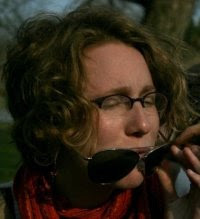Yesterday I was listening to a CBC podcast of Shelagh Rogers' new show, "The Next Chapter." She was interviewing Steven Galloway, author of the novel The Cellist of Sarajevo. The novel is set during the 1992-1996 Siege of Sarajevo and is based on a real-life event. During the siege a cellist who played in the Sarajevo Opera witnessed a shell fall in the street and kill twenty-two people. So he sat with his cello in the crater left by the shell and played a piece of music every day for twenty-two days. One piece of music for each person who had been killed. The novel takes place over the course of those twenty-two days and explores how three fictional characters are affected by what's going on around them.
Shelagh asked, "what is it about the music that restores something to them?" In response, Steven Galloway began to talk about the way the arts tend to be perceived in North America, referencing the recent election. He juxtaposed the view of the arts as a luxury that we can enjoy when our bellies and wallets are full against his view that the arts are essential to humanity. He then said a number of things I found poignant enough to take the trouble of writing down:
"Civilization is not roads and buildings and bridges and stock markets. That is what civilization allows you to have. Civilization is an agreement people have to behave toward each other a certain way; the agreement that I'm not going to smash you in the face with my microphone right now and you're not going to do the same to me. There are two fundamental ways we discuss this agreement: one is the law and the other is the arts. The law fails us way before the arts do. The worse things get for human beings the more you find art. That's what the cellist was doing in the book was reminding each of these people, 'You have a responsibility to yourself to keep thinking about this deal that was civilization and to examine your role in it. What you choose to believe, the results of that examination are entirely your own, but you can't, because things are bad, stop thinking about it,'"
He said that the streets in Sarajevo are covered in what people call Sarajevo roses. "The mark a mortar shell makes when it hits the pavement and explodes looks surprisingly like the petals on a rose." Humans can find art even in the scars left by violence.
Later in the interview Shelagh said, "A number of the characters feel certain the world will come and rescue them. And the world doesn't come and rescue them." And Steven responded:
"No. One of the things I noticed when I interviewed a lot of Sarajevan ex-pats and Sarajevans - you start to notice patterns in what they say to you - was that almost to a person what I was told was, 'You know, the worst day of the war for me wasn't when my house was blown up, it wasn't the day my aunt was shot by a sniper. The worst day was when I realized no one was coming, that the way the world was now was not an anomaly. This is how it was now until thing change, if they every do. This is not a dream that I'm going to wake up from, this is the world.' That's a terrible thing to contemplate."
Shelagh told him he reminded her of Timothy Findley answering her question, "Why do you write?" He answered, "Against despair."
I haven't read any of Steven Galloway's books, but this interview was so beautiful that I'm definitely going to. Despite his penchant for describing the world in terms of dichotomies, I find him really insightful. I have always been wary of the word, 'civilization.' It seemed too colonial, always hinting at its opposite, 'savage.' It seemed to create an us-and-them dichotomy and a dichotomy is something I don't trust. But his definition of civilization and the way it can speak through the arts rings true for me. The people who realized the world wasn't coming for them were realizing how many people in the world weren't holding up their end of the agreement. And yet it's so easy to feel overwhelmed when I think of how many breaches of this contract are taking place right now, and how I don't know what to do to stop them. But the example of the cellist (whose identity I would love to know) gives me hope. If the arts are so intrinsically linked to the civilization contract then this is one way, however small it may be, for me to uphold the agreement.
Subscribe to:
Post Comments (Atom)

Wow, what an interesting post.
ReplyDeleteAnd what an interesting story about the cellist. I'll definitely look into the Cellist of Sarajevo someday.
It's funny that you mention the line how art is what people turn to after their bellies are full etc. Certainly there are many people in this country who feel this way, but as for the artists, I find that most of the true artists that I know need their art form, just as much as they need to eat or breathe. :)